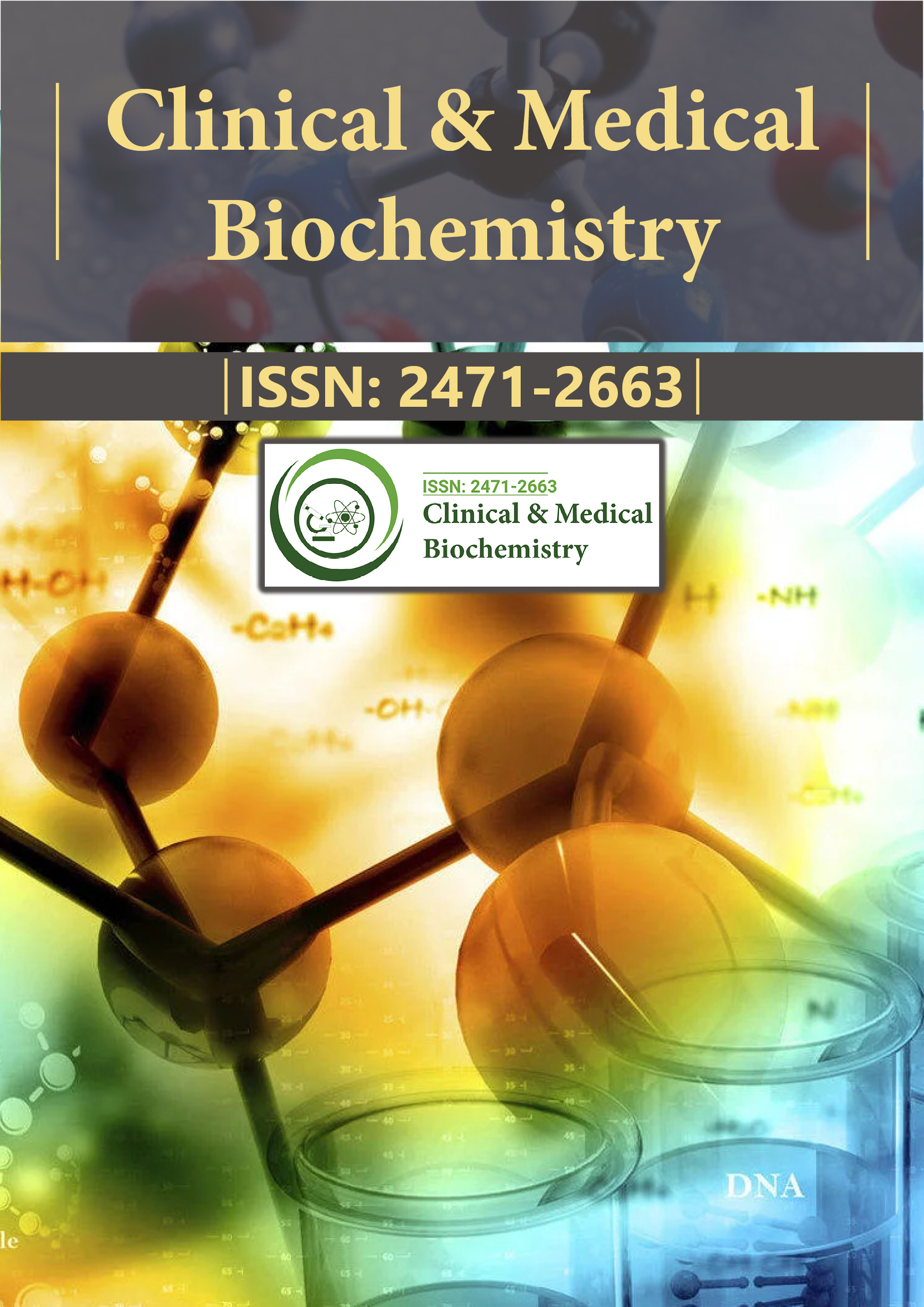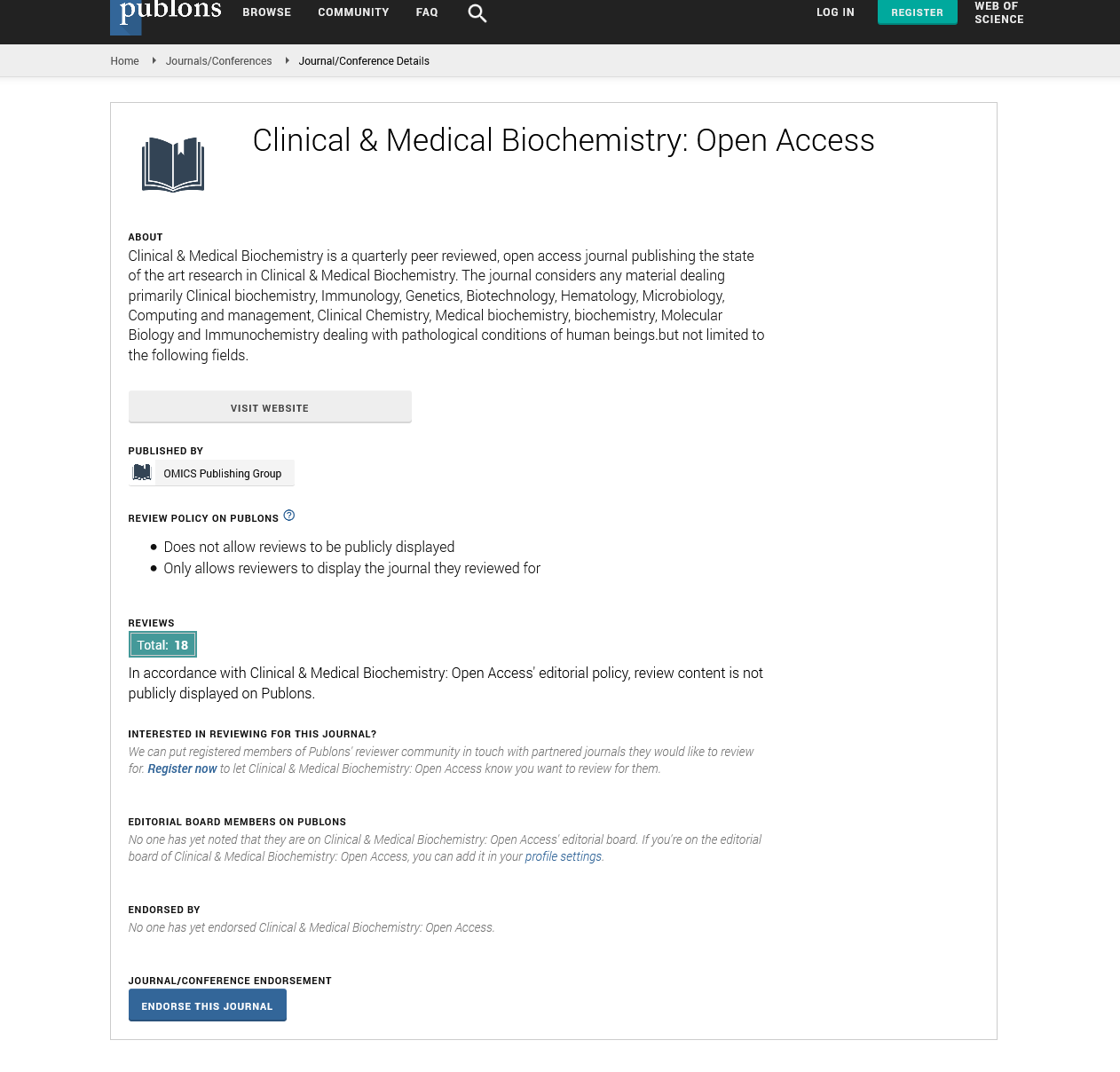Indexed In
- RefSeek
- Directory of Research Journal Indexing (DRJI)
- Hamdard University
- EBSCO A-Z
- OCLC- WorldCat
- Scholarsteer
- Publons
- Euro Pub
- Google Scholar
Useful Links
Share This Page
Journal Flyer

Open Access Journals
- Agri and Aquaculture
- Biochemistry
- Bioinformatics & Systems Biology
- Business & Management
- Chemistry
- Clinical Sciences
- Engineering
- Food & Nutrition
- General Science
- Genetics & Molecular Biology
- Immunology & Microbiology
- Medical Sciences
- Neuroscience & Psychology
- Nursing & Health Care
- Pharmaceutical Sciences
Opinion Article - (2025) Volume 11, Issue 2
Inherited Metabolic Disorders: Genetic Origins, Clinical Manifestations, Diagnosis, Management, and Global Health Importance
Bent Havsteen*Received: 30-Apr-2025, Manuscript No. CMBO-25-29631; Editor assigned: 02-May-2025, Pre QC No. CMBO-25-29631; Reviewed: 16-May-2025, QC No. CMBO-25-29631; Revised: 23-May-2025, Manuscript No. CMBO-25-29631; Published: 30-May-2025, DOI: 10.35841/2471-2663.25.11.254
Description
Inherited Metabolic Disorders are a group of rare genetic conditions resulting from mutations in genes that encode enzymes responsible for metabolism. These genetic defects impair the body’s ability to convert food into energy or to eliminate metabolic byproducts, leading to an accumulation of toxic substances or a deficiency of essential compounds. These disorders are typically inherited in an autosomal recessive manner, though some follow autosomal dominant or X-linked patterns. When both parents are carriers of a defective gene, their offspring have a 25% chance of being affected. Newborns with inherited metabolic disorders may appear normal at birth but can develop severe symptoms within days, weeks, or months, depending on the nature and severity of the condition.
Metabolic pathways affected by these disorders include those involved in the metabolism of amino acids, carbohydrates, fatty acids, organic acids, purines, pyrimidines and lysosomal storage. One of the most well-known inherited metabolic disorders is phenylketonuria, caused by a deficiency in the enzyme phenylalanine hydroxylase, which converts the amino acid phenylalanine into tyrosine. Without treatment, phenylalanine accumulates in the blood and brain, leading to intellectual disability, behavioral problems and seizures. Early detection through newborn screening and dietary management can prevent irreversible damage. Another example is maple syrup urine disease, a disorder of branched-chain amino acid metabolism, which can lead to life-threatening metabolic crises if not promptly diagnosed and managed with a restricted diet.
Glycogen storage diseases represent another category of inherited metabolic disorders, characterized by defects in enzymes responsible for the synthesis or breakdown of glycogen, the storage form of glucose. These disorders can affect the liver, muscles, or both, leading to hypoglycemia, muscle weakness and growth retardation. Pompe disease, a lysosomal storage disorder, involves the accumulation of glycogen in muscles due to acid alpha-glucosidase deficiency. The infantile form presents with cardiomegaly, hypotonia and respiratory failure, often resulting in death within the first year of life without enzyme replacement therapy.
Fatty acid oxidation disorders are characterized by an inability to break down fatty acids for energy, particularly during periods of fasting or illness. Medium-Chain Acyl-CoA Dehydrogenase Deficiency (MCADD) is one of the most common disorders in this group. Affected individuals may experience hypoglycemia, lethargy, seizures, or sudden death during metabolic stress. Newborn screening has greatly improved outcomes by identifying affected infants early, allowing parents to avoid fasting and to manage illness aggressively. Urea cycle disorders involve defects in enzymes that help eliminate ammonia, a byproduct of protein metabolism. Accumulated ammonia is toxic to the brain and can lead to vomiting, lethargy, cerebral edema, coma and death. Prompt intervention with protein restriction, medications and in some cases liver transplantation is necessary to control ammonia levels.
Lysosomal storage disorders result from deficiencies of enzymes that break down complex molecules within lysosomes, the cellular structures responsible for waste processing. Examples include Gaucher disease, Tay-Sachs disease and Niemann-Pick disease. These disorders lead to the accumulation of substrates within cells, causing organ dysfunction, neurological decline and skeletal abnormalities and in many cases, premature death. Enzyme replacement therapy and substrate reduction therapy have been developed for some lysosomal storage disorders, offering hope for improved quality of life and extended survival.
Diagnosis of inherited metabolic disorders typically involves a combination of clinical evaluation, biochemical testing, genetic analysis and newborn screening programs. Biochemical tests may detect abnormal metabolites in blood, urine, or cerebrospinal fluid. Tandem mass spectrometry has become a standard method for newborn screening, allowing early detection of multiple conditions from a single blood sample. Genetic testing confirms the specific mutation and helps guide treatment, prognosis and family counseling. Early diagnosis is critical, as many of these conditions are life-threatening without prompt intervention but are manageable with proper care.
Management of inherited metabolic disorders often involves dietary modifications, supplementation of deficient compounds, enzyme replacement therapies and medications to reduce toxic metabolites. In some cases, organ transplantation may be considered, particularly in disorders involving liver or kidney failure. The goal of treatment is to prevent metabolic crises, support normal growth and development and minimize complications. Multidisciplinary care involving metabolic specialists, dietitians, genetic counselors and primary care providers is essential for optimal outcomes.
Although individually rare, inherited metabolic disorders collectively represent a significant burden for affected individuals and healthcare systems. Advances in genomics, molecular biology and therapeutic development are continually improving diagnostic accuracy and expanding treatment options. However, many challenges remain, including limited awareness among healthcare providers, variable access to screening and therapies and the need for long-term follow-up and psychosocial support. Research into gene therapy and precision medicine holds promise for future curative treatments.
Conclusion
In conclusion, inherited metabolic disorders are a diverse group of genetic diseases with complex biochemical bases and wideranging clinical manifestations. Early detection through newborn screening, accurate diagnosis through biochemical and genetic testing and individualized management plans are crucial for improving health outcomes and quality of life. Continued research, public awareness and global collaboration are essential to advancing care for individuals affected by these rare but impactful disorders.
Citation: Havsteen B (2025). Inherited Metabolic Disorders: Genetic Origins, Clinical Manifestations, Diagnosis, Management and Global Health Importance. Clin Med Bio Chem. 11:254.
Copyright: © 2025 Havsteen B. This is an open-access article distributed under the terms of the Creative Commons Attribution License, which permits unrestricted use, distribution and reproduction in any medium, provided the original author and source are credited.

